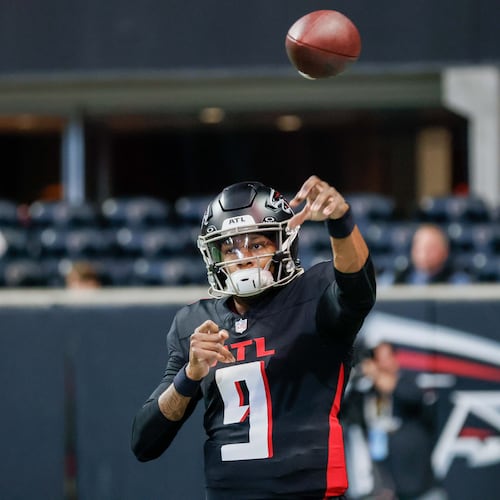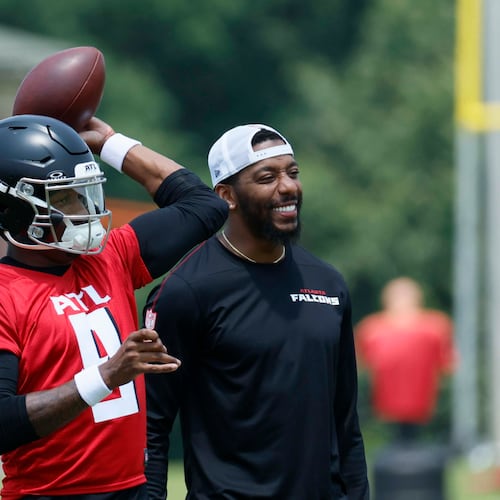NFL owners adopted a new policy Wednesday aimed at ending – or at least concealing from public view – player protests during the national anthem before games.
The policy, approved by the owners at the league’s spring meetings in Atlanta, will require players who are on the field to “stand and show respect for the flag and the anthem.” However, the policy will provide the option for players who choose not to stand to remain “in the locker room or a similar location off the field” until after the anthem is performed.
The owners’ action came after much controversy the past two years over some players kneeling during the anthem.
Under the policy adopted Wednesday, teams will be fined by the league if any of their players or other personnel are on the field and do not show respect for the anthem. In turn, it will be up to individual teams whether to fine or otherwise punish their players for violations of the policy.
» More: Read the new policy
NFL commissioner Roger Goodell was flanked by four owners when he announced the measure in a Buckhead hotel ballroom. The announcement followed several hours of discussion by the owners about the issue during their two-day meetings here.
“Clearly our objective as a league … is that we want people to be respectful of the national anthem,” Goodell said. “We want people to stand – that’s all personnel – and make sure they treat this moment in a respectful fashion. That’s something we think we owe.
“We were very sensitive to making sure we give players choices, but we do believe that moment is an important moment.”
Players previously were required to be on the field for the anthem.
The owners hope their action will take attention off the controversy and return the focus to the games.
“I think it has been a good discussion internally coming up with this policy,” Arizona Cardinals owner Michael Bidwell said. “(We) look forward to getting the focus back on football, getting back to football in 2018.”
That may be wishful thinking to some degree, judging from the immediate reaction of the NFL Players Association.
The NFLPA said in a written statement that the league “chose to not consult the union in the development of this new ‘policy.’” The union said it will “challenge any aspect of it that is inconsistent with the collective bargaining agreement.”
“NFL players have shown their patriotism through their social activism, their community service, in support of our military and law enforcement and, yes, through their protests to raise awareness about the issues they care about,” the union’s statement said.
The union also said the policy “contradicts the statements made to our player leadership” by Goodell and NFL Management Council chairman John Mara “about the principles, values and patriotism of our league.”
Asked what he would say to the union about its statement, Goodell said: “Anything I have to say to the union, I’ll say to them directly.”
Pittsburgh Steelers owner Art Rooney II said the policy considered a wide range of perspectives.
“Obviously, we want to continue to work with our players and make sure that they feel their point of view has been respected,” Rooney said. “Those who are not comfortable standing for the anthem have the right to stay off the field, so we’re not forcing anybody to stand who doesn’t feel that’s within the way they feel about particular subjects.
“I think that we listened to a lot of different viewpoints, including our fans, over the past year.”
Falcons owner Arthur Blank wasn't available for comment after the owners' vote – he was traveling to New York for a Wednesday night event -- but in an interview with The Atlanta Journal-Constitution on Tuesday, he expressed support for a measure such as the one adopted.
Blank has backed the players, but he nonetheless said Tuesday he thinks they should stand for the anthem and accurately predicted the NFL would adopt a policy reflecting that.
In a written statement that preceded his news conference Wednesday, Goodell said: “It was unfortunate that on-field protests created a false perception among many that thousands of NFL players were unpatriotic. This is not and was never the case.”
The national-anthem issue first arose for the NFL in the 2016 season, starting as a protest by former San Francisco 49ers quarterback Colin Kaepernick against police brutality and racial injustice. The protests grew around the league last season.
Goodell said the new policy was approved unanimously by the owners, but 49ers owner Jed York told reporters he abstained from the vote.
Other actions taken by the owners on the final day of their meetings Wednesday included awarding the 2023 Super Bowl to Glendale, Ariz., the 2024 Super Bowl to New Orleans and the 2019 NFL draft to Nashville.
About the Author
Keep Reading
The Latest
Featured



